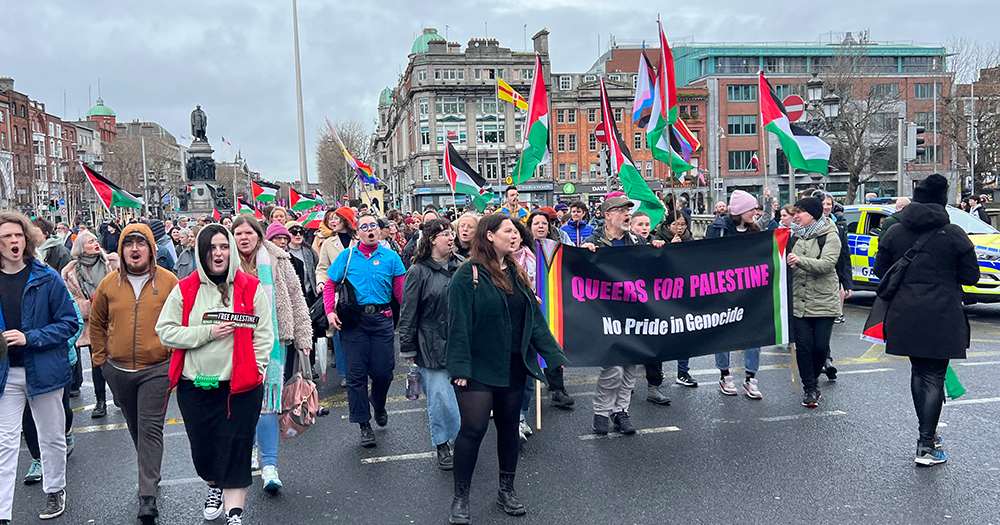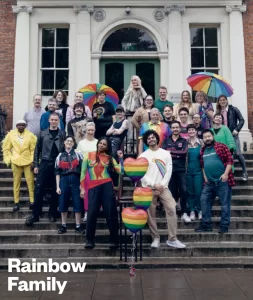“In our thousands, in our millions, we are all Palestinians.”
This familiar chant, which can be heard at the national marches for Palestine in Dublin, is a demonstration of solidarity with the Palestinian people, and captures the very essence of why Palestinian liberation concerns us all: equality, freedoms, and basic human rights cannot be taken for granted by any of us.
They are not a given for all people, often fragile when and where they do exist, and must be fought for and protected at every turn.
Queer people both here in Ireland and across the globe know only too well what it’s like to be oppressed and denied basic rights. It’s part of our history, and for queer people in different parts of the world, in various ways and to varying degrees, it is the current reality.
We understand that the struggle for equality has been, and continues to be, an ongoing endeavour. For queer Palestinians in particular, the struggle for liberation is deeply complex and intersectional.
View this post on Instagram
Through the stark and horrifying lens of what’s happening in Gaza, we see that all forms of oppression are interconnected: resistance to imperialism, racism, patriarchy, capitalism, and colonialism cannot be separated from the fight against homophobia, transphobia, and the queer struggle for equality.
All systems of oppression reinforce one another, meaning they have to be fought simultaneously, and not in isolation. This is precisely why Palestinian liberation is a queer issue.
Queers for Palestine (Ireland) hold this idea of interconnectedness and the corresponding need to show solidarity with all struggles for liberation at the core of what we stand for. Our grassroots activist group was established in January this year to bring queer representation, participation, and visibility to the national marches for Palestine which take place on a regular basis in Dublin.
Like everyone, we have been witnessing the brutality perpetrated against, and the collective punishment of, the Palestinian people in Gaza (and the West Bank) by Israel. We are horrified by the scale and nature of the violence and firmly hold the view that this amounts to nothing less than genocide.
We condemn the killing of innocent civilians on all sides, and we call for an immediate and permanent ceasefire in Gaza as a first step towards liberating Palestine from a long and painful history of colonial oppression, vicious apartheid, and ruthless ethnic cleansing.
View this post on Instagram
When first established back in January, Queers for Palestine (Ireland) was conscious that people in Palestine could see, through various media platforms, the increased support for them in Ireland and around the world.
We hoped that by having a presence in the marches that queer people in Palestine would know that we see them, and that, in solidarity with them, we march to demand a ceasefire and ultimately the liberation of all Palestinians.
Queer solidarity with Palestine is not new. It has a long, rich, and transnational history. It expanded as a response to Israeli ‘pinkwashing’ campaigns which aimed to falsely present Israel as an LGBTQ+ progressive nation and an oasis of gay rights in the Middle East, while simultaneously insinuating that Palestinian society is intrinsically regressive.
This policy of pinkwashing by Israel aims to create the false narrative that being queer and being Palestinian cannot co-exist. Queer Palestinians reject this, aspiring instead to live their lives as queer people within a liberated Palestine. Indeed, queer Palestinians inform us that for them, the struggle for queer liberation and Palestinian liberation cannot be separated out.
View this post on Instagram
The current situation in Gaza is horrifying. At the time of writing, with 36,000+ dead, 75,000+ injured, and two million people forcibly displaced, the scale of the violence, extent of the destruction, and the devastation of day-to-day life is beyond comprehension.
There is, however, a continuously growing global movement of grassroots and civil society organisations, including Jewish individuals and groups, who refuse to standby in silence.
As one of these groups, Queers for Palestine (Ireland) march with a view to creating a space where queer people can come together in solidarity, not just with queer Palestinians, but all Palestinian people, and demand that our government takes concrete action.
We welcome the Irish government’s recognition of the State of Palestine as part of a first step towards the right of Palestinians to self-determination. But we argue that this symbolic gesture must also be accompanied by actions that will have a tangible effect, including sanctions on Israel, and the introduction of the Occupied Territories Bill.
Come join us at our next march for Palestinian Liberation. All welcome.
In pride, in solidarity, in collaboration. No Pride in Genocide.
Instagram: @queers_for_palestine_ireland Email: [email protected]
This story originally appeared in GCN’s June 2024 issue 384. Read the full issue here.
© 2024 GCN (Gay Community News). All rights reserved.
This article was published in the print edition Issue No. 384 (June 1, 2024). Click here to read it now.
Support GCN
GCN is a free, vital resource for Ireland’s LGBTQ+ community since 1988.
GCN is a trading name of National LGBT Federation CLG, a registered charity - Charity Number: 20034580.
GCN relies on the generous support of the community and allies to sustain the crucial work that we do. Producing GCN is costly, and, in an industry which has been hugely impacted by rising costs, we need your support to help sustain and grow this vital resource.
Supporting GCN for as little as €1.99 per month will help us continue our work as Ireland’s free, independent LGBTQ+ media.

